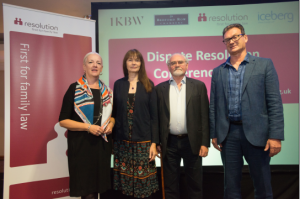The extraordinary tale for successfully resolving relationship breakdowns

The perfect example of how to listen and emphasise is demonstrated by the extraordinary tale of Jo Berry and Pat Magee. I chaired Resolution’s Dispute Resolution Conference in Nottingham in October and the key note address was given by Jo and Pat. Jo Berry is an extraordinary woman. Her father, Sir Anthony Berry, was one of the five people killed (there were many injured too) in the bombing of the Grand Hotel at the 1984 Tory Party conference. Pat Magee was the man who planted that bomb. For 27 years he was a committed member of the Provisional IRA and was interned (imprisoned without trial) between June 1973 and November 1975. At his trial in September 1986 he received eight life sentences and expected to serve a minimum period of 35 years for each. Whilst in prison he completed a PHD on the depiction of Irish Republicans in fiction. As part of the Good Friday Agreement he was released from prison in 1999 after having served 14 years.
Jo Berry, seeking to make sense of her grief and anger went to extraordinary lengths to meet Pat Magee in order to understand what drove him to plant the bomb and also to tell him about her dad. After much difficult and careful toing and froing Jo and Pat finally met for the first time in November 2000 at a friend of Jo’s house in Dublin.
Pat and Jo took it in turns to explain how they first met and began to talk to each other. At the first meeting Pat was understanding and sympathetic but was clear that he felt able to explain what he had done in the context of the republican struggle. However, even in that first meeting he was impressed with the way Jo was listening to him and that she was not simply a very angry person, bitter at the loss of her father. In their first meeting this enabled Pat to allow his guard to lower and was able to explain on a more personal level about how he felt and to ask Jo about her relationship with her father. That first meeting lasted three hours. Exhausted with it all they agreed to meet again and did so over a period of time in order to better understand each other.
Flowing from that, Pat and Jo formed a charity “Building Bridges for Peace” in October 2009. The charity works to enable divided communities and the general public to explore and better understand the roots of conflict, terrorism and violence. Jo and Patrick have given talks in Palestine, Lebanon, Rwanda and throughout the UK. They have presented nearly 300 times.
Their tale is one of the most powerful examples of successful restorative justice. Pat says “I’m still trying to come to terms with the fact that I have hurt somebody. That I have killed her father, and remarkably this woman is prepared to come and see me and listen to me and talk to me and respect my point of view”. Pat is a supporter of the Good Friday Agreement although he is very concerned indeed about the potential effect of Brexit on that agreement and the significant period of peace that the agreement has brought. Pat holds the view that political progress is achievable through purely open, democratic and constitutional means.
The reception they received at the Resolution Conference was really quite remarkable. The 220 delegates listened intently for more than an hour. For most of the time you could hear ‘a pin drop’. At the end both Pat and Jo received a standing ovation from everybody in the hall.
I was also lucky enough to sit next to Pat and Jo with Jo O’Sullivan at the conference dinner and they were both very good company and keen to explain how they came together and how their presentations in the UK, Ireland and around the world have been so successful.
I am pleased to say that the vast majority of my mediations conclude successfully – without wanting to curse the two next couples that I start with next week. However, there are often times when people are stuck on issues and can’t move forward. In the pre-meetings I have with each individual alone, I explain what I hope they will each do in order to move matters forward and reach a settlement where they have failed to do so before. It is simple to say but not very easy to do. It is to listen, to listen carefully to what the other person is saying and understand their position. I say that you do not necessarily need to agree with what they are saying but simply to listen, acknowledge and understand. It is only when you hear and understand what each other’s concerns, worries or aims are, that the participants are each able to problem solve and move forward with the mediator’s skilled help and assistance.
Jo and Pat’s tale is extraordinary. They put the success of their relationship and the level of communication that they have down to the ability to be able to listen and empathise with each other. Jo said that it is not simply about forgiveness but understanding.
Many of the people who attended the conference were moved considerably by what they heard. It was an immense moment and one that many of us will never forget. I was asked to conclude the session with some closing remarks. I knew that the presentation was going to be of considerable value to Resolution mediators and collaborative lawyers. It meant that these practitioners had one of the finest examples of how to listen and how to empathise. I said that in mediations next week, a month’s time and in years to come, mediators would be using the tale of Jo and Pat for their mediation participants as an example of how if you listen and understand you will be able to move forward. Only a few days after the conference I bumped into Resolution colleague Thomas Brownrigg who said he had already used the story as an example with mediation clients.
Just to add to the remarkable nature of the whole event, at dinner the night before Pat and Jo confirmed that the day of the presentation would be the 34th anniversary of the bombing itself demonstrating the extraordinary courage of them both to perform on the day and share their experiences. Pat and Jo are very clear that they do not have answers but what they do have is a dialogue, respect, trust and a way forward. The work they are doing in this area is invaluable.
Please make donations to the Building Bridges Charity which you can do at www.buildingbridgesforpeace.org
David Emmerson
Anthony Gold solicitors
Accredited mediator, collaborative lawyer, deputy district judge and higher rights advocate.
Chair of Resolution’s Dispute Resolution Committee

No comments